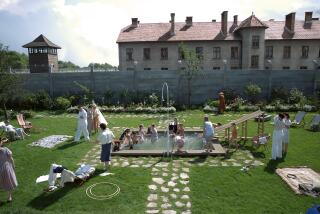MUSIC REVIEW
Eric Zeisl is the emigre who got away. You won’t find much about this composer -- who fled Vienna in 1938 and joined the ranks of important foreign musicians in Southern California -- in the studies of those emigres that have been coming out lately.
A major new history of film music by Mervyn Cooke published by Cambridge University makes no note of a composer who wrote music (uncredited) for the 1946 “Postman Always Rings Twice” and other Hollywood films. Though a treasure trove of the obscure, the 50-CD Milken Archive of American Jewish Music series ignores the composer of “Requiem Ebraico.”
And so it goes, but not entirely. It is much too early to speak of a Zeisl revival, or more accurately a Zeisl rediscovery, because his music is little performed or recorded and much still needs scholarly editing to get into publishable shape. But a small concert and gathering Wednesday night at the Villa Aurora, the German cultural exchange center in Pacific Palisades, had the feeling of a political gathering. Chamber music and songs were performed. The composer’s daughter, Barbara Zeisl Schoenberg, spoke. Audience members, in discussions afterward, asked, what is on the horizon. How to spread the word?
The occasion was the 50th anniversary of the composer’s death. Born in 1905, Zeisl was echt Viennese -- his family ran a coffeehouse. He was a prodigy who began publishing his songs as a teenager. His style was not advanced and his music languished in the old world, although with a modern mood.
Zeisl did not adapt well to Los Angeles. He resented his Hollywood work. He was allergic to sunlight and could barely stand to be in daylight. He stopped writing songs and concentrated on instrumental music. He told The Times in 1950 that he was “a finished product of the old world” and that he couldn’t change even if he wanted to. While teaching an evening composition class at Los Angeles City College in 1959, he suffered a heart attack and died. He was 54.
Zeisl wasn’t entirely obscure. Milhaud and Stravinsky mourned him. He wrote a cello concerto for Gregor Piatigorsky, still unpublished. But his music has languished. His Piano Concerto, written in the early ‘50s, wasn’t performed until 2005 (by the unexpectedly adventurous Saratoga Symphony in Silicon Valley). It has just been recorded in Vienna by the Radio Symphony, with Gottlieb Wallisch as soloist, on the CPO label. The piece, to my astonishment, swept me up from it first seconds with an irresistible melody and never let go for 35 minutes.
There are many reasons why Zeisl’s music has fallen deep within the cracks. He wasn’t of his time or place, and there were bigger stars in the firmament. His daughter married the son of one of them, Arnold Schoenberg. And at Wednesday’s concert, she noted that her father “was no giant, not one of the great figures in music.” But, she continued, his name means “songbird” in German, and he was one.
The Villa Aurora concert featured three performers from Germany -- violinist Sascha Bauditz, pianist Karola Theill and mezzo-soprano Christine Lichtenberg. The program was peculiar, an attempt to give an overview of Zeisl’s career, but it came off as fragmented.
Some of the evening was devoted to juvenilia and the bulk of it to music written in Europe. There were no complete works other than a cycle of seven songs from the early ‘30s that was presented broken up throughout the program.
Two movements from the piano work “November” and the song “Komm susser Tod” (“Come Sweetest Death”) captured Zeisl’s disconsolate mood in 1937 and 1938, as his beloved Vienna became inhospitable. Bauditz played, somewhat laboriously, “Menuhim’s Song” from Zeisl’s unfinished opera, “Job,” which was written in Paris as the composer prepared to sail to the States in 1939. Based on a novel by Joseph Roth that helped inspire Zeisl to rediscover his Jewish heritage, the opera features a protagonist who cannot speak and communicates only through the violin.
Excerpts from Zeisl’s playful “Pieces for Barbara,” written for his 4-year-old daughter, were a lively relief from music of suffering. The 1950 “Brandeis Sonata,” for violin and piano, was also excerpted. The full sonata -- as does so much of Zeisl’s music -- awaits contemporary champions.
That may take time. But Zubin Mehta and James Conlon have lately enlisted in the Zeisl camp. And the addictive recording of the Piano Concerto gives me hope.
--
More to Read
The biggest entertainment stories
Get our big stories about Hollywood, film, television, music, arts, culture and more right in your inbox as soon as they publish.
You may occasionally receive promotional content from the Los Angeles Times.











